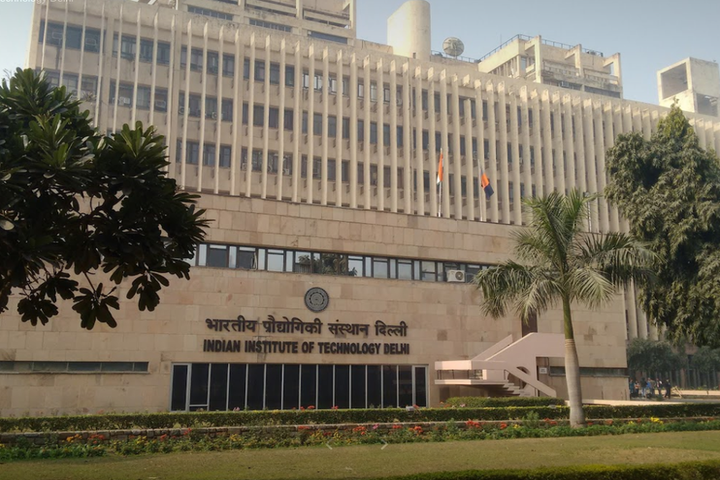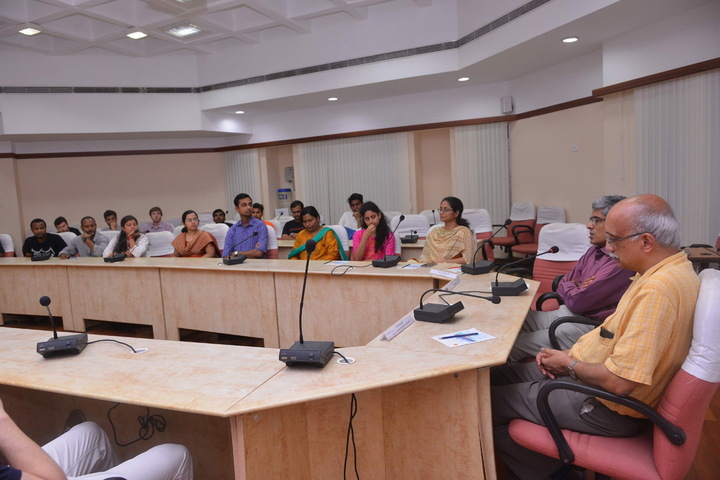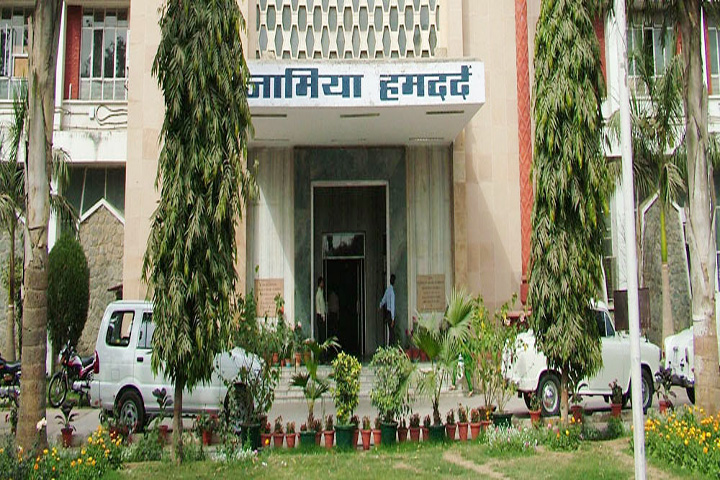What is Biology
Biology is one of the important branches of science that deals with the study of life, living things and their important processes in detail. It focuses on the evolution of human beings, genetics, cell biology, reproduction processes, chemical bonds and ecology. It involves studying different species, the formation of life, life-sustaining processes and elements, disorders, diseases, and treatments.
In India, around 280 colleges and universities offer Biology specialisation. Some of the popular colleges in India are Presidency College, Loyola College, Sri Venkateshwara College, and St Joseph’s College. After fulfilling the eligibility criteria, students can apply to their desired colleges.
After graduation, applicants can explore various career options. Biologist, Horticulturist, and Biochemist are the popular job roles. Biology graduates can contribute to work settings such as hospitals, clinics, academics, and pharmaceutical companies and can also practise privately. The average salary of a Biologist in India is Rs. 4.5 LPA.
The biology field has not only provided large opportunities to the students but has also improved their lives. The growth prospects in the field have attracted many candidates to pursue their courses.
Highlights - Biology Course
Particulars | Values |
Branch Name | Biology |
Degree | |
Duration | UG: 4 years PG: 3 years |
Eligibility | UG: 10+2 in PCB PG: Bachelor’s degree in a similar field |
Admission Process | Admission Examination/ Direct Admission |
Entrance Exam | UG: CUET UG, NEET, AIIMS, IISER Aptitude test PG: CUET PG, JNUEE, PGIMER, JIPMER |
Course Fees | Rs. 4,000 to Rs. 13 Lakhs |
Job Profiles | Horticulturist, Biologist, Biochemist, Lecturer |
Average Salary | Rs. 2 LPA- Rs. 15 LPA |
Recruiting Companies | Qiagen, Genentech, National Institutes of Health, Cold Spring Harbor Laboratory, Becton, Dickinson and Company, Syngenta, Pfizer, Johnson & Johnson |
Specialisation or Similar Ones
Biology is a broad field with numerous specialisations and related areas of study. These specialisations offer various career opportunities in research, healthcare, environmental management, biotechnology, and many other areas. Here are some specialisations and similar fields within biology:
Public Health |
Top Colleges in India Offering Biology
Many educational institutes in India offer Biology courses and their specialisations. To pursue a course in Biology a student has to select a very good and reputed college. Here are a few top colleges where a student can get admission into the Biology courses with their respective fees.
Colleges | Fee Structure |
Rs. 77,000 | |
Rs. 37,500 | |
- | |
Rs. 1.50 Lakhs | |
Rs. 7,800 | |
| - | |
- | |
Rs. 4,800 | |
- | |
- | |
- |
Note: The fee structure provided above can be for any particular Biology course (Diploma/ Degree/PGD).
Top Private Biology Colleges in India
Many private colleges in India offer Biology courses. The fee can be significantly higher in a private college as compared to a government institute. Some of the top private Biology colleges are mentioned below along with their fees.
Colleges | Fee Structure (Entire Course) |
- | |
Rs. 13.13 Lakhs | |
- | |
- | |
Rs. 24,100 | |
Rs. 30,000 | |
Rs. 2.03 Lakhs | |
Rs. 3.78 Lakhs | |
Rs. 2.46 Lakhs | |
- | |
Rs. 1.22 Lakhs |
Top Government Biology Colleges in India
Numerous government colleges in India offer Biology courses. Admissions are based on previous academic accomplishments and entrance examination scores. The table below lists some of the top government colleges in India that offer Biology courses.
Colleges | Fee Structure |
- | |
- | |
- | |
- | |
- | |
Rs. 9,000 | |
- | |
- | |
- | |
Rs. 33,800 | |
- |
Eligibility Criteria (UG & PG) of Biology
Candidates aspiring to pursue Biology courses can apply for undergraduate programmes, postgraduate programmes, diploma courses, and certificate courses. To get admission into these courses, the candidates should fulfil the eligibility criteria required by colleges and universities.
Eligibility Criteria for UG Courses
Eligibility criteria are a set of standards that should be followed by candidates. Graduates can apply for Biology undergraduate degrees after completing their 10+2 in the science stream from a recognised board. To be eligible for admission, candidates need to meet the following requirements:
- Candidates applying for UG courses in Biology must have completed 10+2 level or any equivalent level examination from a recognised institute in India.
- The stream in the 10+2 level should be science- Physics, Chemistry and Biology.
- The minimum aggregate score is 50 per cent. There may be a relaxation of 5 per cent for the candidate belonging to the reserved category.
- After clearing the entrance examination, final admission is made based on the cutoff score.
Top Entrance Exams for UG Courses
Applicants must clear some entrance examinations for admission to the Biology courses. It is one of the most important qualification requirements. Some of the popular entrance examinations in the field of Biology are discussed below.
Exam Name | Exam Level | Conducting Body | Exam Schedule |
National | NTA | ||
National | NTA | ||
National | All India Institute of Medical Sciences | - | |
National | The Indian Institutes of Science Education and Research | - |
Eligibility Criteria for PG Courses
For admission to Biology courses at the PG level, candidates must have graduated from a recognised university with a valid aggregate score. Eligibility details can be found on the official website of the college or the programme brochure. The following requirements are mandatory for a postgraduate degree in Biology.
- Candidates aspiring to pursue PG degrees in Biology must have completed their undergraduate programme in the related discipline.
- A minimum of 55 per cent aggregate marks is required in the entrance examination and for SC/ST this requirement varies around 45 per cent to 50 per cent.
- After clearing the entrance examination, candidates are eligible for admission to the programme.
Top Entrance Exams for PG Courses
Many examinations are conducted at national, state, and university levels. Candidates should check the examinations accepted by their preferred institute. Mentioned in the table below are the popular entrance examinations at the PG level.
Exam Name | Exam Level | Conducting Body | Exam Schedule |
National | NTA | ||
National | National Board of Examinations (NBE) | ||
National | National Board of Examinations (NBE) | ||
National | AIIMS New Delhi | - | |
National | Dte General of Medical Services (Army) | - |
Scope of Biology in India and Abroad
The popularity of a Biology course is on the rise. It is a vast field consisting of many sub-disciplines. Due to its broad scope, it has attracted many aspirants. Students can opt for job roles such as ecologists, scientists, researchers, and environmentalists. With the rise in many diseases and health problems, the government has established many medical institutes.
After graduation, students can work at hospitals, clinics, labs, and research institutions. Medical science graduates are one of the highest paid anywhere in the world. They have good career opportunities in academics, industrial research, clinical trials, and environmental conservation.
Course Fees Biology
| Minimum Fees | Maximum Fees | |||
|---|---|---|---|---|
| Private | Government | Private | Government | |
| UG | ||||
| PG | ||||
| DOCTORAL | ||||
| DIPLOMA | ||||
Course Subjects
The subjects included in the biology course curriculum provide in-depth knowledge of key aspects related to biological life forms. In this section, we will discuss the undergraduate and postgraduate syllabus of Biology.
Biology Syllabus for UG Degrees
The topics taught in the undergraduate degree in Biology are Botany, Biochemistry, Basics of Zoology, and Biochemistry, and Physiology. In the table below, we have mentioned the B.Sc Biology of Deen Dayal Upadhyaya Gorakhpur University.
Semester 1 | |
Basics of Botany | Microbiology & Plant Pathology |
Techniques in Microbiology & Plant Pathology | Basics of Zoology |
Cytology, Genetics and Immunology | Cell Biology and Cytogenetics Lab |
Basics of Chemistry | Fundamentals of Chemistry |
Quantitative Analysis | - |
Semester 2 | |
Archegoniate & Plant Architecture | Land Plants Architecture |
Biochemistry and Physiology | Physiological, Biochemical & Haematology Lab |
Bioorganic and Medicinal Chemistry | Biochemical Analysis |
Semester 3 | |
Flowering Plants Identification & Aesthetic Characteristics | Plant Identification technology |
Molecular Biology, Bioinstrumentation & Biotechniques | Bioinstrumentation & Molecular Biology Lab |
Chemical Dynamics & Coordination Chemistry | Physical Analysis |
Semester 4 | |
Economic Botany, Ethnomedicine & Phytochemistry | Economic Botany, Ethnomedicine & Phytochemistry |
Commercial Botany & Phytochemical Analysis | Molecular Biology, Bioinstrumentation & Biotechniques |
Bioinstrumentation & Molecular Biology Lab | Quantum Mechanics and Analytical Techniques |
Instrumental Analysis | |
Semester 5 | |
Plant Physiology, Metabolism & Biochemistry | Molecular Biology & Bioinformatics |
Experiments in physiology, Biochemistry & molecular biology | Diversity of Non-Chordates, Parasitological and Economic Zoology |
Diversity of Chordates and Comparative Anatomy | Lab on Virtual Dissection, Anatomy, Economic Zoology and Parasitological |
Semester 6 | |
Cytogenetics, Plant Breeding & Nanotechnology | Ecology & Environment |
Cytogenetics, Conservation & Environment management | Evolutionary Biology and Developmental Biology |
Ecology, Ethology, Environmental Science and Wildlife | Lab on Environmental Science, Behavioral Ecology, Developmental Biology, Wildlife |
Biology Syllabus for PG Degrees
In postgraduate degrees, students will learn advanced concepts and techniques. It will also include an internship in the second semester and a thesis in the final semester. Biomolecules, Immunology, Microbiology, and Cell Biology are the important concepts covered in the course curriculum. The syllabus mentioned below is taken from the Central University of Andhra Pradesh.
Semester 1 | |
Biomolecules and Biochemistry | Cell Biology |
Microbiology and Microscopy | Biophysics and Structural Biology |
Biodiversity and Evolutionary Biology | Lab-1 |
Semester 2 | |
Immunology | Molecular Biology |
Genetic Engineering and Genome Editing | SEC: Academic Writing |
Internship | Signal transduction and cancer biology |
Biostatistics and Bioinformatics | Lab-2 |
Semester 3 | |
Plant Physiology | Animal physiology |
Genomics and Proteomics | SEC: e-Resources |
Developmental Biology | Metabolomics and Metabolic Engineering |
Lab-3 | - |
*Semester 4 will include project work or dissertation
Careers in Biology
Biology has always been and always will be one of the most important career options for science students. It is directly related to humans, our environment, and other life forms. With significant research projects being organised in different fields of Biology, attractive career opportunities are available to the students, both in private sector companies as well as public sector entities.
The graduates can work as researchers, botanists, ecologists, and biochemists. They can also earn handsome salary packages after gaining significant experience.
Doctor: A doctor is a medical professional who diagnoses and treats people with health issues. The specialisation will decide what will be the field of speciality as a doctor for example a physician, a surgeon, a veterinary doctor and so on.
Lecturer: Lecturers are highly educated professionals responsible for teaching medical science and Biology in colleges and institutes. They impart theoretical and practical knowledge to students.
Biochemist: Biochemists research and help in producing various medicines, solutions and other medical equipment. Their work is essential in fields like medicine, agriculture, and environmental science.
Ecologist: Ecologists research the relationship between living organisms and the environment. They also survey local communities and spread awareness related to ecological issues.
Botanist: Botanists research and study about plants and their interaction with the environment. Their work is essential in developing sustainable practices and discovering new plant-based resources.
Upcoming trends
The field of biology is rapidly evolving, with several emerging trends shaping its future. Here are some of the key upcoming trends in biology:
- CRISPR and Gene Editing
- Synthetic Biology
- Single-Cell Genomics
- Microbiome Research
- Immunotherapy
- Epigenetics
- Systems Biology
Job Profiles and Top Recruiters
Upon successful completion of Biology courses, students get a great number of career options. The choices vary from being professional medical doctors in hospitals and clinics to professors in colleges and universities. Choices of jobs also vary in terms of the specialisation a student opts for in his course.
Top Recruiters:
- Qiagen
- Genentech
- National Institutes of Health
- Cold Spring Harbor Laboratory
- Becton, Dickinson and Company
- Syngenta
- Pfizer
- Johnson & Johnson
Average Salary
Many career options are available for the graduates. The salary will depend on some factors such as the location of the company, the skills and experience of the candidate, and the job profile chosen by the candidate. In the table below, we have mentioned the popular job profiles along with their respective salaries.
Job Profiles | Average Expected Salary |
Horticulturist | Rs. 5.2 LPA |
Biological Scientist | Rs. 6 LPA |
Biochemist | Rs. 2.6 LPA |
Lecturer | Rs. 4 LPA |
Source: Ambition Box
The salary figures mentioned anywhere in these articles are just for reference purposes. Please treat them as such. Actual salaries may vary depending on respective candidates, employer, job location and numerous other factors.
Required Skillset for Biology
Candidates require certain skills to fully benefit from the course. These skill sets will help them grow both personally and professionally. Listed below are some of the important skills required by the students.
- Analytical Skills
- Critical Thinking
- Interest and Aptitude in Biology
- Attentiveness
- Research skills
Course Curriculum for Biology
The biology course curriculum is mostly focused on living organisms and the environment. The course contents vary according to the level of specialisation, the focus is on intricate biological processes in a living organism to ecology. Topics included in the course curriculum provide knowledge regarding various aspects of organisms and their respective environment.
Students can acquire knowledge regarding various essential topics like genetic research, human anatomy, cell reproduction, evolutionary processes, homeostasis, biochemical reactions, energy production, disorders, diseases, life-sustaining components, and different species of living organisms.
Popular Biology Entrance Exams in India
NEET
Exam Date: 04 May, 2025
JEE Advanced
Application Process: 23 Apr, 2025 - 02 May, 2025
IISER Aptitude Test
Exam Date: 25 May, 2025
CUET UG
Exam Date: 08 May, 2025 - 01 Jun, 2025
Frequently Asked Questions (FAQs)
Question: What are the eligibility criteria for a PG diploma course in Computational Biology?
Answer :
Candidates must have passed the 10+2 level or equivalent level examination from any recognised board/university in India. The stream in the higher secondary level must be science - Physics, Chemistry and Biology. The minimum mark required in the +2 level is 50 per cent. For students belonging to the SC/ST category, the minimum mark requirement is 45 per cent.
Question: What is the age limit for UG courses in Biology?
Answer :
The lower age limit for appearing for courses like MBBS is 17, and the upper limit is 25. For NEET entrance, the lower age limit is 17, and the upper age limit is not specified.
Question: What are some of the best colleges for pursuing a Biology course?
Answer :
Some of the best colleges to pursue Biology courses are AIMS, PGIMER, JIPMER, Jain University, Manipal University, ICFAI University, ITDC Lucknow and many more.
Question: What are the total marks for the NEET UG paper?
Answer :
The maximum mark of the NEET UG paper is 720.
Question: What is the NEET score required to get into very good medical colleges in India?
Answer :
A score of 600 or above is required to get admission to the top medical college in India.
Questions related to Biology
i have taken physics, chemistry and biology as subjects in 12th and no maths, but my KCET admit card shows maths also, do i have to take maths exam also..
Hello,
KCET admit cards list all papers, but you only need to sit for exams you registered. Since you opted for Physics, Chemistry and Biology, you must appear for those three and can skip Mathematics. The Maths slot on your admit card doesn’t obligate you to take that test. However, confirm your chosen subjects in the KEA portal or call their helpdesk before the exam to avoid any possible last minute issues.
Hope this helps you,
Thank you
Can biology students appear for CG PET exam?
Yes, biology students can appear for the CG PET exam, but their eligibility is limited to specific courses. For B.Tech in Biotechnology, candidates must have completed 10+2 with Physics and Biology/Mathematics, along with one of Chemistry, Biotechnology, or a Technical Vocational subject. They should have secured at least 45% aggregate marks (40% for SC/ST/OBC/PWD) in these subjects. However, for other engineering branches, Mathematics is a mandatory subject in 10+2. Therefore, biology students without Mathematics are eligible only for B.Tech in Biotechnology through CG PET.
https://engineering.careers360.com/articles/cg-pet-eligibility-criteria?utm_source=
Can biology students appear for CG PET exam?
Yes, biology students can appear for the CG PET exam, but their eligibility depends on the course they wish to pursue. If you have completed your 10+2 with Biology as a subject and Physics along with Chemistry (and possibly a vocational subject), you can apply for B.Tech in Biotechnology through CG PET.
However, if you are interested in other engineering courses like Mechanical Engineering, Computer Science, Civil Engineering, etc., you would need to have Mathematics as a subject in your 10+2. So, biology students without Maths are not eligible for these other courses.
In summary:
Eligible for: B.Tech in Biotechnology (if you have Biology, Physics, and Chemistry).
Not eligible for: Other B.Tech courses (require Mathematics i
n 10+2).
Can biology students appear for CG PET exam?
Hey Disha ,
I hope you are doing good in your studies. As per your mentioned query , yes biology students appear for CG PET exam for the course btech biotechnology.
To know more , refer this :
https://engineering.careers360.com/articles/cg-pet-eligibility-criteria
All the best!!
Good morning sir/mam,iam 12th complete 2025,iam waiting for result,12th study in Bio computer Group,in subject physics, chemistry,Biology, Botany,Iam study intrest for B.SC. Nursing or anaesthesia ,is available telling your sir/mam...
Hello,
yes, with your Bio-Computer group and subjects like Physics, Chemistry, Biology and Botany you are eligible for B.Sc Nursing and B.Sc Anesthesia courses. both are available in many medical and paramedical colleges after 12th. you may need to qualify NEET or the respective state entrance exams for admission.











 Answer later
Answer later









